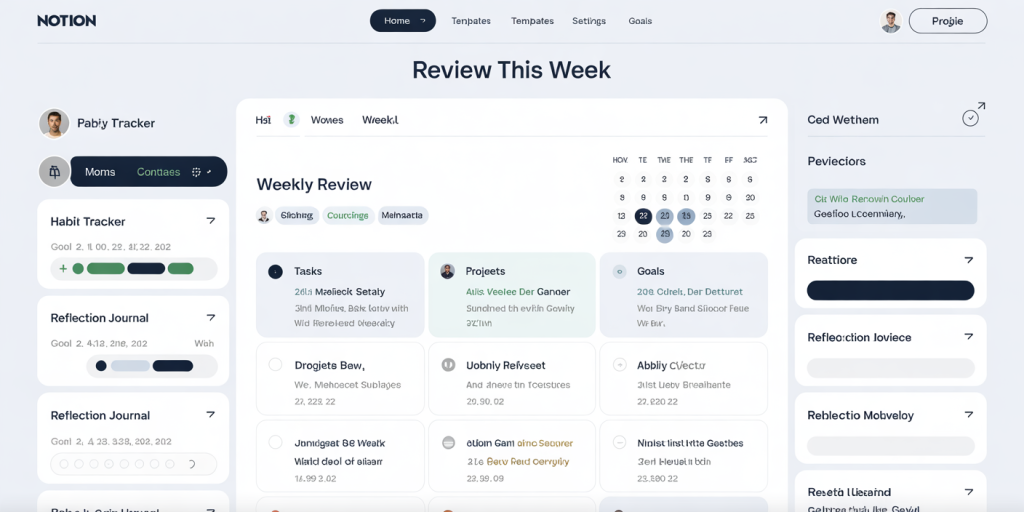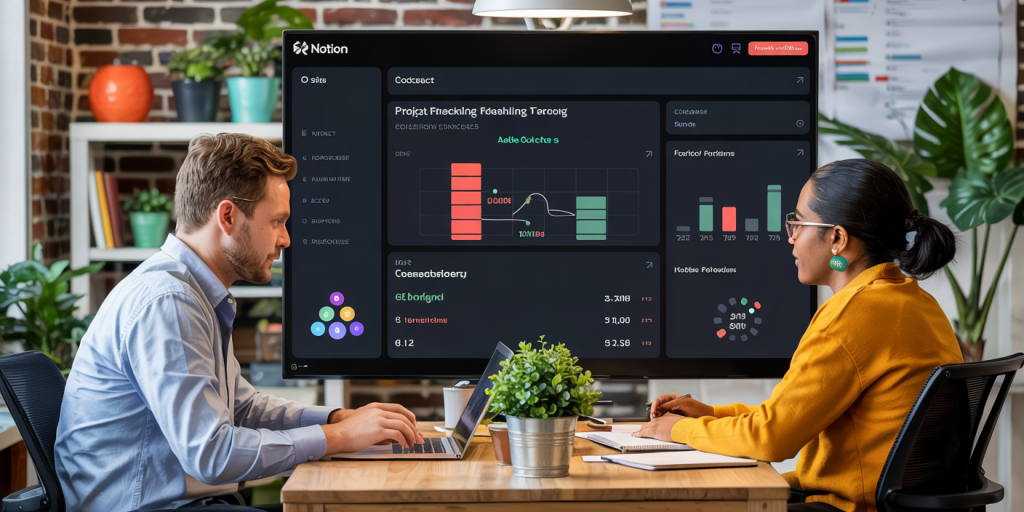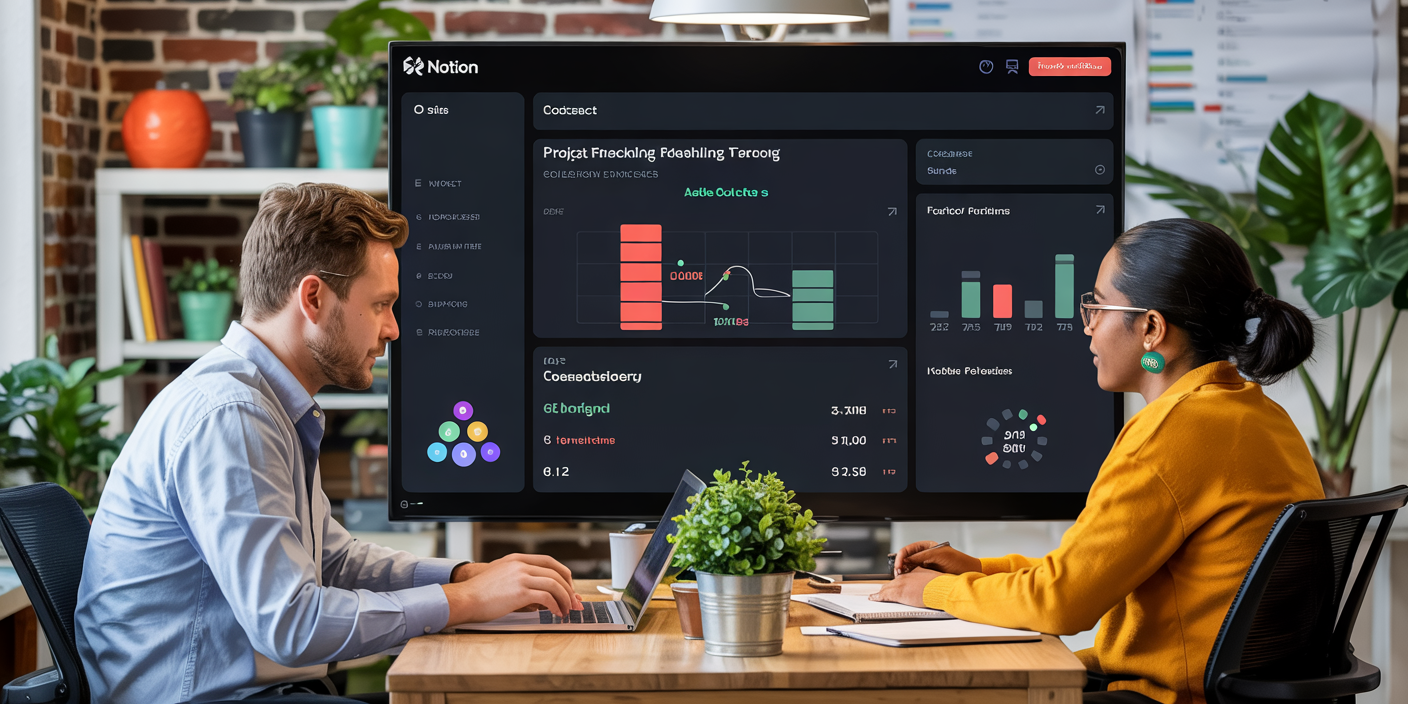How to Set Up a Weekly Review Dashboard in Notion
In today’s fast-paced professional landscape, maintaining clarity and organization amidst diverse tasks is crucial. One highly effective productivity tool that continues to gain traction is Notion—a versatile workspace known for its flexibility and customization capabilities. Among its many applications, setting up a weekly review dashboard in Notion stands out as a strategy to help individuals and teams track progress, prioritize tasks, and optimize workflow.
A weekly review dashboard consolidates all personal and professional information into a single, interactive view that encourages reflection and planning. This empowered approach aligns well with productivity methodologies such as GTD (Getting Things Done) and time-blocking, which have been shown to increase task completion rates by up to 25% (Harvard Business Review, 2020). By leveraging Notion’s database features, users can craft a tailored review dashboard that not only enhances productivity but also fosters self-awareness and continuous improvement.
The Core Components of a Weekly Review Dashboard
When designing a weekly review dashboard in Notion, it’s essential to identify the core components that will provide a comprehensive overview of your week. Generally, these components include task tracking, calendar events, notes and reflections, goals progress, and habit monitoring.

Task tracking is foundational. Notion allows users to embed linked databases that display tasks filtered by due dates or completion status. This dynamic view helps highlight overdue assignments or tasks slated for the upcoming week. For example, a marketing manager might create a dashboard that filters tasks by project, priority level, and deadline, thereby ensuring no critical deliverables slip through the cracks.
Equally important is the inclusion of a section dedicated to calendar events. Syncing your Google Calendar or manually inputting key meetings and deadlines into a Notion calendar view provides a visual timeline, ideal for weekly retrospection. Adding a notes or reflections block encourages introspection on what went well and what challenges emerged, an approach based on academic research that suggests weekly self-reflection can improve performance by 12% (Journal of Occupational and Organizational Psychology, 2019).
Step-by-Step Guide to Building Your Dashboard in Notion
Step 1: Create a New Page Start by opening Notion and creating a new page titled “Weekly Review Dashboard.” This page will be your primary workspace for reviewing achievements and planning ahead.
Step 2: Add Linked Databases Import or link existing task databases by choosing “Create linked database” and selecting your main task list. Use filters to display tasks with due dates falling within the current week or tasks marked as “In Progress.” For instance, a software developer could filter tasks by sprint cycles to review ongoing coding assignments.
Step 3: Integrate a Calendar View Embed a calendar block that syncs with your Google Calendar or any other external scheduling tool. This integration offers a visual representation of appointments, deadlines, and events. In cases where direct integration isn’t feasible, manually duplicating critical events ensures no scheduling mishaps occur.
Step 4: Create Reflection Sections Add toggle lists or text blocks labeled “Wins of the Week” and “Areas for Improvement.” Encourage yourself or your team to jot down insights or lessons learned. This qualitative data complements quantitative task data and aids in forming actionable plans.
Step 5: Track Goals and Habits Incorporate progress bars or checklists for weekly goals. Habit trackers can also be added for improved well-being or skill development targets. For example, a sales team leader might track weekly cold calls, client meetings, and lead follow-ups within the same dashboard.
Practical Examples of Weekly Review Dashboards
To better illustrate the potential of weekly review dashboards in Notion, consider two professional cases:
Case 1: Freelance Graphic Designer A freelance graphic designer manages multiple client projects simultaneously. Using a Notion dashboard, they link databases that track client requests, project deadlines, and invoicing schedules. The dashboard’s calendar block highlights submission deadlines and client meetings, while reflection sections help the designer assess creative challenges faced during the week. Habit tracking is used to ensure regular upskilling, such as practicing new design software features.
Case 2: Remote Marketing Team A remote marketing team employs a collective weekly dashboard that syncs tasks assigned to team members, upcoming campaign deadlines, and social media content calendars. Team members add reflections on campaign performance to a shared “Wins and Learnings” section. The dashboard also includes trackers for KPIs such as engagement rate and lead generation, allowing for data-driven adjustments in their strategies.
Comparative Table: Traditional Task Management vs Notion Weekly Review Dashboard
| Feature | Traditional Task Lists | Notion Weekly Review Dashboard |
|---|---|---|
| Task Visualization | Static Lists | Dynamic filtered databases |
| Calendar Integration | Separate calendar apps | Embedded calendar with filters |
| Collaboration | Limited sharing | Real-time team collaboration |
| Reflection & Notes | Usually separate notebooks | Embedded qualitative insights |
| Customization | Minimal | Highly customizable |
| Goal & Habit Tracking | Often missing or external | Integrated within the dashboard |
The comparative evidence highlights how Notion’s weekly review dashboard serves as a centralized hub, streamlining multiple productivity elements into one cohesive interface.

Optimizing Your Dashboard for Maximum Impact
After establishing your weekly review dashboard, optimizing it is key to sustaining beneficial habits and productivity gains. One simple optimization is automating task status updates using Notion formulas or third-party automation tools like Zapier or Automate.io. This reduces manual input and keeps the dashboard updated in real-time.
Another useful tactic is color-coding tasks and priorities. Visual cues boost cognitive processing and can improve recall by up to 40%, according to a study by 3M Corporation (2017). Use color indicators to differentiate high-priority tasks from routine ones, or to signal task completion status.
Moreover, revise your dashboard design periodically. A quarterly or biannual review of the dashboard’s structure ensures it aligns with evolving workflows and goals. Solicit team feedback if applicable—continuous iteration reaps sustained productivity benefits. Adding widgets such as progress bars, motivational quotes, or habit streaks can enhance engagement.
Integrating Data Analytics and Metrics for Deeper Insights
Beyond basic task management, Notion can serve as a powerful data analytics platform when utilized for weekly review dashboards. By integrating properties such as numerical scores, task durations, or satisfaction ratings, you can start analyzing trends over time.
For example, a project manager could track average task completion time across sprints, identifying bottlenecks or skill gaps. A sales team could analyze weekly lead conversion rates by linking sales pipeline status databases. Visualizing these metrics with Notion’s built-in charts or connected tools like Google Data Studio amplifies the decision-making process.
Data-driven weekly reviews help uncover patterns otherwise missed in fragmented tracking methods. According to the Project Management Institute (2023), teams using integrated dashboards improve project success rates by 20%. Incorporating such analytics elevates your weekly review beyond merely looking backward—it becomes a tool for strategic forward planning.
Looking Ahead: Future Trends in Notion Weekly Review Dashboards
The future of weekly review dashboards in Notion is bright, shaped by increased automation, AI integrations, and collaborative enhancements. Upcoming Notion features may include AI-assisted insights that automatically summarize weekly progress and suggest areas for improvement, smart scheduling based on task priority, and voice-command capabilities for hands-free updates.
Additionally, the rise of decentralized workforces underscores the need for dashboards that support multi-user real-time collaboration with customizable permission levels. Enhanced integrations with communication platforms like Slack and MS Teams are expected to bring task discussions, updates, and reviews closer together.
Emerging trends also point towards deeper incorporation of mental well-being monitoring, embedding mood trackers and stress level check-ins within weekly reviews. This holistic approach reflects a broader workplace shift towards recognizing the interplay between productivity and employee health.
As Notion continues evolving, weekly review dashboards will become increasingly indispensable for professionals seeking clarity, accountability, and continuous growth in a world overflowing with tasks, distractions, and opportunities.
By carefully setting up a weekly review dashboard in Notion and continually refining it based on real-world needs, individuals and teams can harness powerful organizational structures that transform how tasks are managed, goals are tracked, and progress is celebrated. Whether you are a freelancer juggling deadlines or part of a dispersed corporate team, this tailored tool provides a comprehensive snapshot of your week’s accomplishments and challenges—informing smarter decisions for the future.
